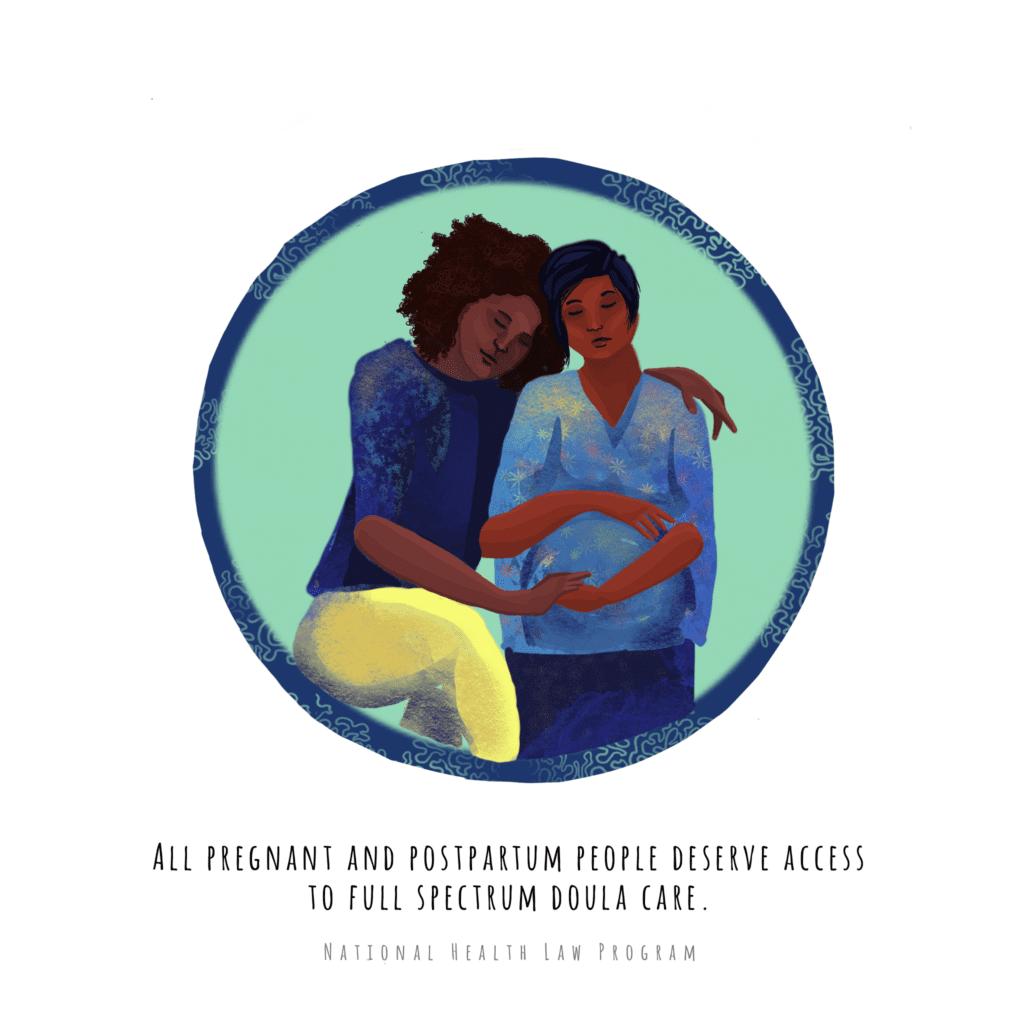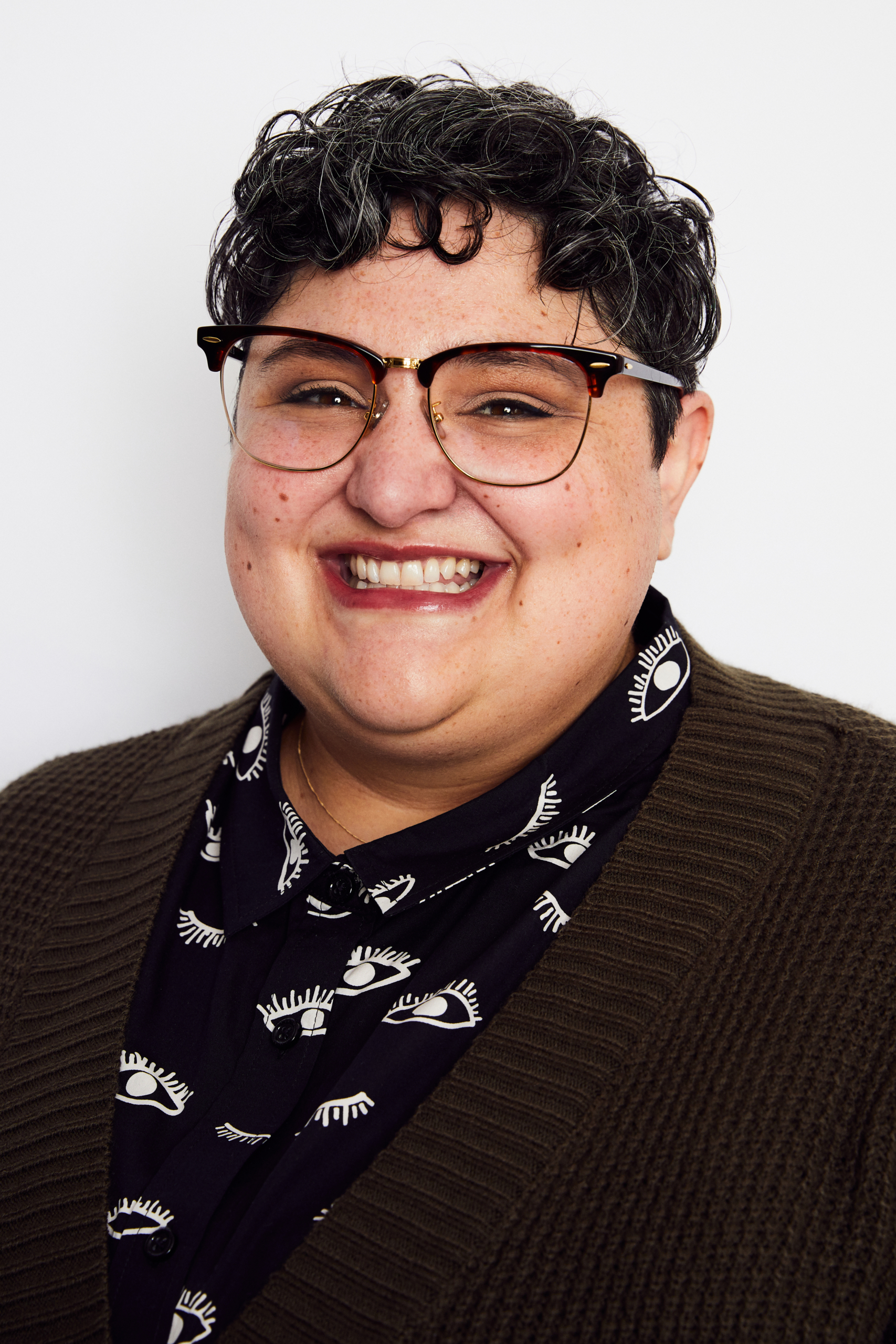Doula Medicaid Project
About the Doula Medicaid Project
The National Health Law Program (NHeLP)’s Doula Medicaid Project seeks to improve health outcomes and address inequities in maternal health by ensuring that all pregnant, postpartum, and post-pregnancy people who want access to a doula can have one. Our starting point in this work is expanding access to sustainable, equitable, and inclusive programs for Medicaid coverage for doula care.
People with low incomes in the United States are at a higher risk of poor birth outcomes, and pregnant and birthing people of color, especially Black and Indigenous/Native American pregnant and birthing people, are especially vulnerable. Doula care is one promising approach to combating inequities in maternal health. Pregnant and birthing people receiving doula care are more likely to have improved health outcomes for both themselves and their infants, including fewer low birth weight babies, lower rates of cesarean births, and higher breastfeeding initiation rates. Doulas can also help reduce the impacts of racism and racial bias in health care on pregnant people of color by providing individually tailored, culturally appropriate, and client-centered care and advocacy.
NHeLP supports and advocates for full spectrum doula care, which we define as doula care for all the ways in which a pregnancy can end, including doula care for prenatal, labor/delivery, and the postpartum period, as well as doula care for abortion, miscarriage, and stillbirth.

Illustrator M Jay Smith created the lovely artwork which is the centering image for the Doula Medicaid Project. Watch a short time-lapse video of the creation of the design and read Smith’s artist statement here.
To achieve the goal of universal coverage of full spectrum doula care, we are engaged in advocacy work on various fronts, including:
- Working with doulas and other stakeholders across the country to provide technical assistance, information sharing, and other support as they propose policies, pass legislation, and implement programs for Medicaid and private insurance coverage for doula care in their states and regions;
- Educating agencies, legislators, and other stakeholders about the importance of expanding coverage of full spectrum doula care;
- Lifting up best practices from our advocacy work to achieve sustainable, equitable, and inclusive programs for Medicaid and private insurance coverage of doula care;
- Creating and publishing resources including fact sheets, reports, issue briefs, and other materials relevant to expanding access to doula care; and
- Maintaining multiple listservs to share state and regional updates, resources, events, and other topics relevant to expanding access to doula care.
At NHeLP, we are lawyers, researchers, and policy advocates. We are not doulas. As such, we seek to do all our work in partnership with and with the guidance of community-based doula groups, doula collectives, and individual doulas, especially Black doulas and Black-led doula groups, as well as doulas and doula groups serving low-income clients.
Note on language: The word “doula” comes from the ancient Greek word for “female servant” or “female slave.” Over time, the term evolved to its modern meaning of a trained professional who provides non-clinical physical, emotional, and informational support during the perinatal period. Doula work has also expanded to include the full spectrum of pregnancy outcomes (e.g., birth, abortion, adoption, miscarriage, stillbirth, and perinatal loss), as well as services to women, men, transgender, and gender non-conforming people. After consideration, NHeLP will continue to use the terms “doula” and “full spectrum doula” in our Doula Medicaid Project work, while also noting alternative terms (e.g., birthworkers, full spectrum support advocates, etc.) in parentheses. Read our issue brief, NHeLP’s Framing and Language in the Doula Medicaid Project, to learn about our process for arriving at this decision.
Doula Medicaid Project Listservs
The Doula Medicaid Project maintains a number of listservs pertaining to expanding access to doula care. To join one or more of these listservs, please fill out this form.
- National Doula Medicaid Listserv exists to share information, resources, and updates around current state, regional, and federal efforts around expanding access to doula care, including Medicaid coverage for doula care. NHeLP’s Doula Medicaid Project sends out monthly email newsletters to the listserv with updates, resources, and events. Access an archive of these monthly email newsletters.
- California Coverage for Doula Care Listserv exists to share information, resources, and updates around efforts to expand access to doula care in California.
- California Doula Access Listserv is an advocacy-based working group for those actively working to troubleshoot and improve California’s doula Medi-Cal benefit. This listserv is solely for doulas and advocates.
Current Efforts at Expanding Access to Doula Care
We are tracking current state and federal efforts at expanding access to doula care, including states that have proposed, passed, and/or are implementing legislative or administrative efforts related to Medicaid coverage for doula care. We have compiled our information in two charts, which you can access below. We hope these charts are helpful resources for doulas, advocates, researchers, legislators, and other stakeholders working on this issue. We are doing our best to update them on an ongoing basis. If you have any corrections, comments, or questions, please contact NHeLP Senior Attorney Amy Chen at chen@healthlaw.org.
Doula Medicaid Resource Library
Our Resource Library collects publications, articles, and other resources from across the country pertaining to expanding access to doula care. You can filter the resources by organization, region (i.e. national, state, or territory), and topic. You can also utilize the built-in search function for keywords or phrases. We plan to continue adding to and updating this Resource Library.
To make it simpler for advocates to find the most important resources to start with, we have created a shortlist of key resources on each of the following topics: case studies of state doula efforts and/or pilot programs; benefits of doula care; cost-benefit analyses of doula care; importance of sustainable and equitable reimbursement for doulas; supporting the doula workforce; and improving hospital, clinical, and medical provider relationships with doulas.
Meet the Team
Meet the Legal and Policy Experts working on NHeLP’s Doula Medicaid Project:

Amy Chen
Senior Attorney
Area(s) of Expertise: Sexual and reproductive health, pregnancy coverage, maternal health, expanding access to doula care, Medicaid coverage for doula…

Alexis Robles-Fradet
Policy Analyst
Area(s) of Expertise: Medi-Cal, Medicaid, Reproductive and Sexual Health, Behavioral Health, Health Equity, EHBsAlexis Robles-Fradet is a Health Policy…